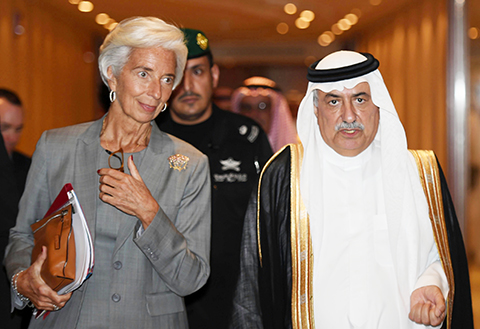 Saudi Finince Minister Ibrahim al-Assaf (L) escorts International Moneytary Fund (IMF) Managing Director Christine Lagarde to a press conference following a meeting with Gulf Cooperation Council (GCC) finance ministers in the Saudi capital, Riyadh, on October 26, 2016. Lagarde is meeting with finance ministers and central bank governors of the Gulf Arab states as persistently low oil prices hit their budgets prompting unprecedented borrowing on world markets. -AFP
Saudi Finince Minister Ibrahim al-Assaf (L) escorts International Moneytary Fund (IMF) Managing Director Christine Lagarde to a press conference following a meeting with Gulf Cooperation Council (GCC) finance ministers in the Saudi capital, Riyadh, on October 26, 2016. Lagarde is meeting with finance ministers and central bank governors of the Gulf Arab states as persistently low oil prices hit their budgets prompting unprecedented borrowing on world markets. -AFP RIYADHL Gulf finance ministers expect to finalize today a deal on value added tax and have also approved excise levies, Saudi Arabia's minister said after regional talks with the International Monetary Fund. The taxes are a response by crude-exporting Gulf nations to a plunge in oil prices. In June, the Gulf Cooperation Council's (GCC) six members agreed on the VAT, a five-percent levy on certain goods to take effect in 2018. "Hopefully tomorrow we'll put the final touches on that issue in our meeting as finance ministers," Saudi Finance Minister Ibrahim Al-Assaf told reporters. "We also approved excise taxes. So we have already taken important steps in that direction" of taxation, he said.
Assaf spoke after chairing talks between his Gulf counterparts and central bank governors with Christine Lagarde, managing director of the International Monetary Fund. Revenue-raising measures including excise and value added taxes are among the IMF's recommendations for Gulf states adjusting their economies to lower crude prices which have slowed regional growth. "All the GCC countries have started strong reforms in response to that new situation," Lagarde said at the same press conference.
They have increased energy prices, begun to control the public sector wage bill, and most have reduced capital spending. "More will be needed," Lagarde said. Oil prices are hovering around $50 per barrel after hitting a 10-year low of less than $30 in January, down from a peak of more than $100 in mid-2014.
Assaf said IMF forecasts for GDP growth of 1.2 percent this year and 2.0 percent in 2017 were "reasonable", as the IMF continues to urge fiscal reforms. At the joint press conference, Assaf said he expects economic growth to be "2.0 percent or less" in 2017. Growth slowed sharply this year as low oil prices strained the budget and led authorities to impose broad spending cuts. The spending crunch also led Saudi Arabia to tap the international bond market with a $17.5 billion bond issue last week, the largest emerging market debt deal in history.
Assaf said the kingdom's debt issues would not be limited to bonds, but would be followed by other instruments such as sukuk. Lagarde said Saudi Arabia should continue to rein in its spending and seek more ways to raise revenues, despite recent increases in oil prices. - Agencies









